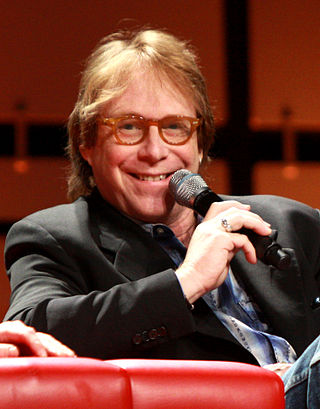
Charles William Mumy Jr. is an American actor, writer, producer, and musician. He came to prominence in the 1960s as a child actor whose work included television appearances on Bewitched, I Dream of Jeannie, The Twilight Zone, Alfred Hitchcock Presents, and a role in the film Dear Brigitte, followed by a three-season role as Will Robinson in the 1960s sci-fi series Lost in Space. Mumy later appeared as lonely teenager Sterling North in the film Rascal (1969) and Teft in the film Bless the Beasts and Children (1971).
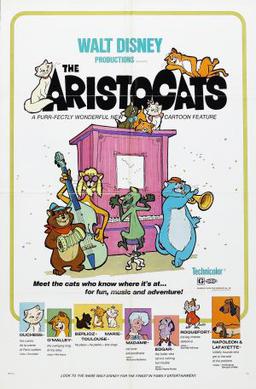
The Aristocats is a 1970 American animated comedy film produced by Walt Disney Productions and distributed by Buena Vista Distribution. It is directed by Wolfgang Reitherman and written by Ken Anderson, Larry Clemmons, Eric Cleworth, Vance Gerry, Julius Svendsen, Frank Thomas and Ralph Wright. It is the final Disney animated film made with the involvement of Walt Disney Productions' co-founder Roy O. Disney before his death on December 20, 1971. The film is based on a story by Tom McGowan and Tom Rowe, and revolves around a family of aristocratic cats, and how an alley cat acquaintance helps them after a butler has kidnapped them to gain his mistress's fortune which was intended to go to them. The film features the voices of Phil Harris, Eva Gabor, Hermione Baddeley, Dean Clark, Sterling Holloway, Scatman Crothers, and Roddy Maude-Roxby.
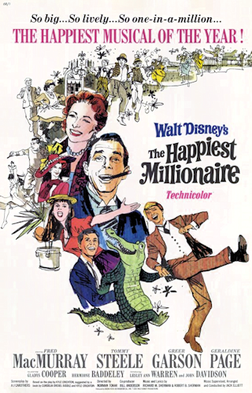
The Happiest Millionaire is a 1967 American musical film starring Fred MacMurray, based upon the true story of Philadelphia millionaire Anthony Drexel Biddle. The film, featuring music by the Sherman Brothers, was nominated for an Academy Award for Best Costume Design by Bill Thomas. The screenplay by A. J. Carothers was adapted from the play, based on the book My Philadelphia Father by Cordelia Drexel Biddle. Walt Disney acquired the rights to the play in the early 1960s. The film was the last live-action musical film to be produced by Disney before his death on December 15, 1966.

The Return of Jafar is a 1994 American direct-to-video animated musical fantasy film produced by Walt Disney Pictures and Television. It is the first sequel to Disney's 1992 animated feature film, Aladdin, made by combining the planned first five episodes of the Aladdin animated television series into a feature-length film.

Eugene Kal Siskel was an American film critic and journalist for the Chicago Tribune who co-hosted a movie review television series alongside colleague Roger Ebert.
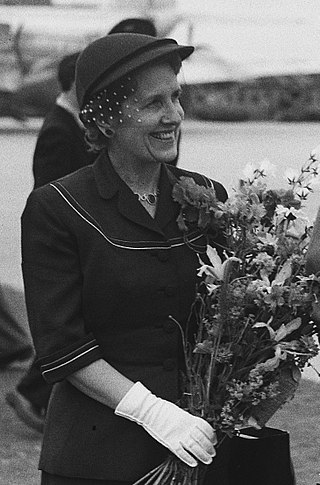
Lillian Marie Disney was an American ink artist at the Walt Disney Animation Studios and the wife of Walt Disney from 1925 until his death in 1966. Born in Spalding, Idaho, Disney graduated from high school in Lapwai before moving to Lewiston to attend college. She left Idaho in 1923 to move to southern California, where she met future husband Walt while working as a secretary for his company.
Rascal or rascals may refer to:
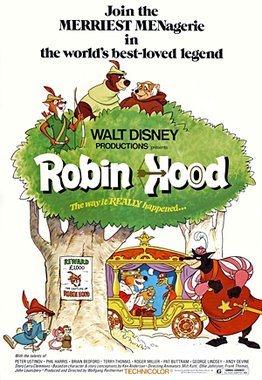
Robin Hood is a 1973 American animated musical adventure comedy film produced by Walt Disney Productions and released by Buena Vista Distribution. Produced and directed by Wolfgang Reitherman, it is based on the English folktale "Robin Hood". Taking place in a world populated by anthropomorphic animals, the story follows the adventures of Robin Hood, Little John, and the inhabitants of Nottingham as they fight against the excessive taxation of Prince John, and Robin Hood wins the hand of Maid Marian. The film features the voices of Brian Bedford, Phil Harris, Peter Ustinov, Pat Buttram, Monica Evans, Terry-Thomas, Roger Miller, and Carole Shelley.

The Muppet Christmas Carol is a 1992 American Christmas musical film directed by Brian Henson, adapted from the 1843 novella A Christmas Carol by Charles Dickens. Although artistic license is taken to suit the aesthetic of the Muppets, the film otherwise follows Dickens' original story closely.
Thomas Sterling North was an American writer. He is best known for the children's novel Rascal, a bestseller in 1963.

Rascal: A Memoir of a Better Era, often referred to as Rascal, is a 1963 children's book by Sterling North about his childhood in Wisconsin, illustrated by John Schoenherr.
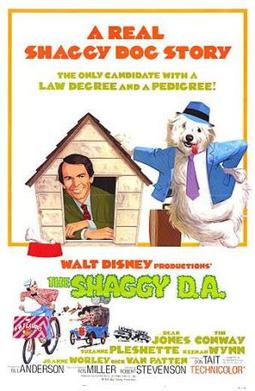
The Shaggy D.A. is a 1976 American comedy film and a sequel to The Shaggy Dog (1959) produced by Walt Disney Productions. It was directed by Robert Stevenson and written by Don Tait. As with the first film in the series, it takes some inspiration from the Felix Salten novel, The Hound of Florence.

The One and Only, Genuine, Original Family Band is a 1968 American comedy musical western film from Walt Disney Productions. Distributed by Buena Vista Distribution, the film is based on a biography by Laura Bower Van Nuys, directed by Michael O'Herlihy, with original music and lyrics by the Sherman Brothers. Set against the backdrop of the 1888 presidential election, the film portrays the musically talented Bower family, American pioneers who settle in the Dakota Territory. The film stars Walter Brennan, Buddy Ebsen, Lesley Ann Warren, John Davidson, and Goldie Hawn in her film debut.

The Computer Wore Tennis Shoes is a 1969 American science fiction comedy film starring Kurt Russell, Cesar Romero, Joe Flynn and William Schallert. It was produced by Walt Disney Productions and distributed by Buena Vista Distribution Company.

Rascal the Raccoon is a 1977 Japanese animated series by Nippon Animation. It is based on the 1963 autobiographical novel Rascal, A Memoir of a Better Era by Sterling North.

Now You See Him, Now You Don't is a 1972 American science fiction comedy film starring Kurt Russell as a chemistry student who accidentally discovers the secret to invisibility. It is the second film in Dexter Riley series.
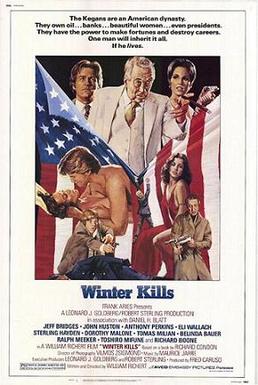
Winter Kills is a 1979 satirical black comedy thriller film written and directed by William Richert, based on the eponymous novel of 1974 by Richard Condon. A fiction inspired by the assassination conspiracy theories about President John F. Kennedy, its all-star cast includes Jeff Bridges, John Huston, Anthony Perkins, Eli Wallach, Richard Boone, Toshirō Mifune, Sterling Hayden, Dorothy Malone, Belinda Bauer, Ralph Meeker, Elizabeth Taylor, Berry Berenson and Susan Walden.
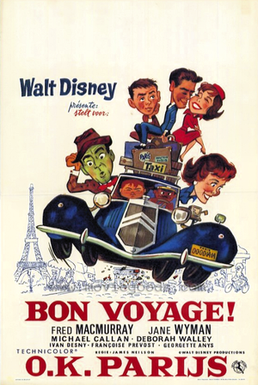
Bon Voyage! is a 1962 American comedy film directed by James Neilson and produced by Walt Disney Productions. It stars Fred MacMurray, Jane Wyman, Deborah Walley, Tommy Kirk, and Kevin Corcoran as the Willard family on a European holiday.
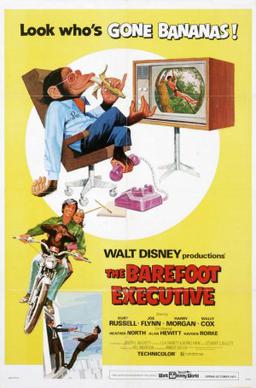
The Barefoot Executive is a 1971 American comedy film starring Kurt Russell, Joe Flynn, Wally Cox, Heather North, Harry Morgan and John Ritter. The plot concerns a pet chimpanzee named Raffles who can predict the popularity of television programs. The film was produced by Walt Disney Productions and directed by Robert Butler. It was frequently aired during The Wonderful World of Disney from the late 1970s through the 1980s.

















